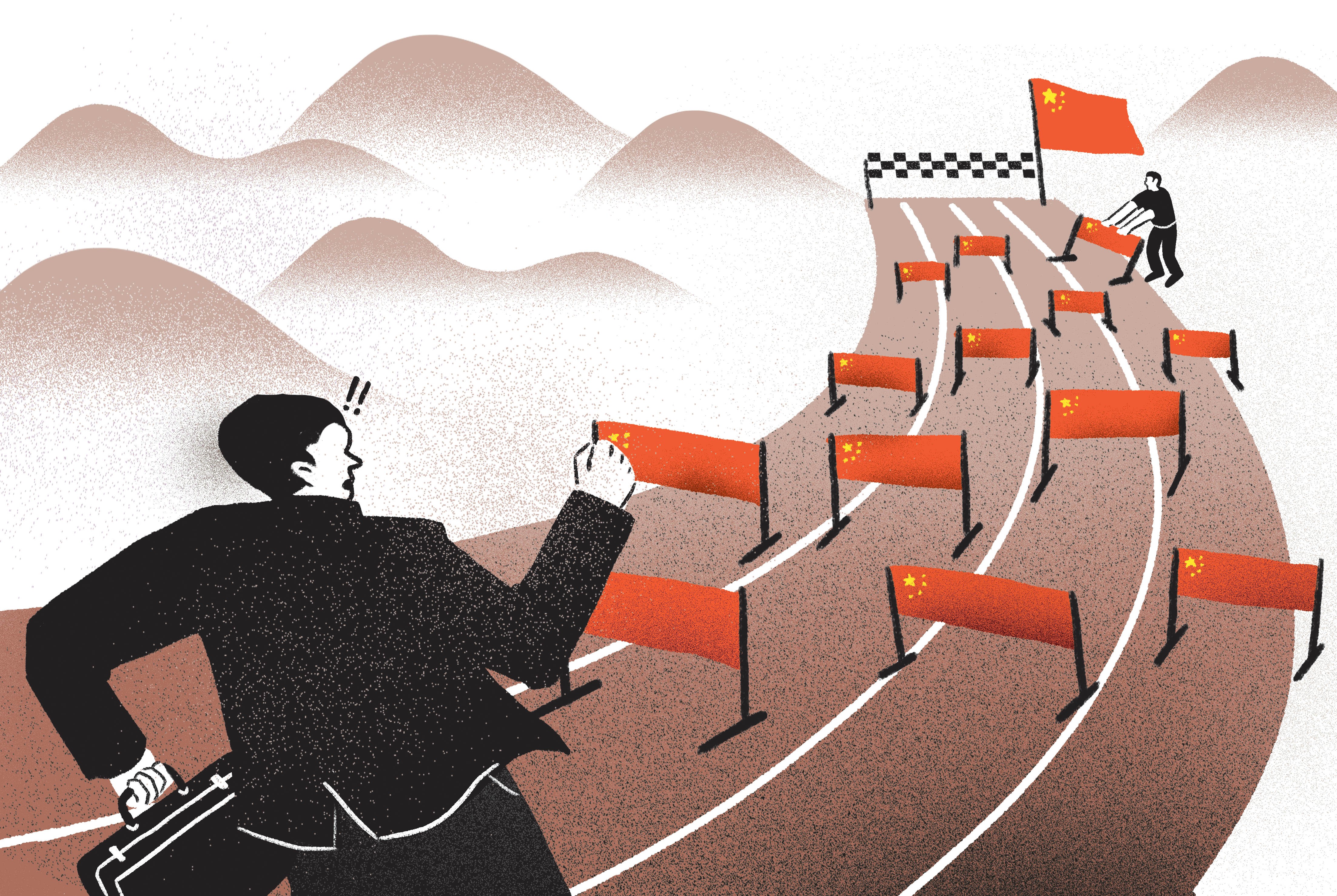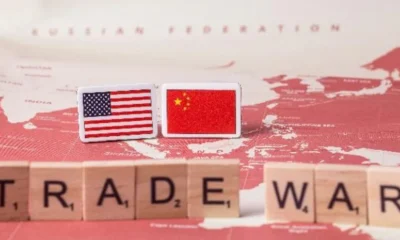Published
12 months agoon

China is gearing up for its annual parliamentary gathering, the much-anticipated “Two Sessions,” where policymakers are expected to address the nation’s economic challenges amid sluggish domestic demand and escalating U.S. trade tensions. The meeting, which kicks off on Tuesday, will bring together the Chinese People’s Political Consultative Conference (CPPCC) and the National People’s Congress (NPC), where key economic policies and fiscal measures will be outlined.
A Historic Cut to Inflation Outlook
One of the headline announcements expected at the opening of the NPC on Wednesday is the revision of China’s annual consumer price inflation target to around 2%—a level not seen in over two decades. This marks a significant drop from the previous target of 3% or more and signals Beijing’s implicit acknowledgment of subdued domestic demand.
The move comes amid persistent deflationary pressures. For seven consecutive quarters, China’s nominal GDP growth has trailed real GDP growth, and consumer prices have remained nearly stagnant—rising just 0.2% in both 2023 and 2024. Producer prices, on the other hand, have been in decline for over two years, further reflecting the slowdown.
Stimulus on the Horizon—but Not Just Yet
While the market is eager for aggressive fiscal intervention, Beijing appears to be taking a measured approach. According to Robin Xing, chief China economist at Morgan Stanley, “Deflation will be persistent, and China will experiment with small policy steps before committing to major stimulus.”
However, analysts expect a shift in the latter half of the year, as growing public dissatisfaction with the sluggish economy may push policymakers to act decisively. This follows a pattern seen in September when high-level government pledges triggered a rally in Chinese stocks, suggesting that investors are closely watching Beijing’s next move.
A Bolder Approach?
Beijing is likely to raise its budget deficit target to 4% of GDP in 2025, up from 3% in 2024—a move that breaks with its long-standing reluctance to surpass the 3% threshold. Additionally, the government is expected to triple its quota for special sovereign bond sales to 3 trillion yuan ($410 billion) and increase special local government bond issuance to 4.5 trillion yuan from 3.9 trillion yuan.
These measures indicate a cautious yet significant pivot towards fiscal expansion to support economic recovery.
Despite the economic headwinds, China is expected to maintain its official GDP growth target at “around 5%,” consistent with previous years. This aligns with President Xi Jinping’s vision of doubling the economy’s size from 2020 levels by 2035.
However, uncertainties persist particularly on the trade front. The U.S.-China trade war appears to be reigniting, with U.S. President Donald Trump imposing an additional 10% tariff on Chinese goods, with further tariffs possibly arriving as soon as April. These restrictions could weigh heavily on China’s export sector, which has remained one of the few bright spots in the economy.

Keeping Cards Close to the Chest
March might be too soon for any major stimulus announcements. Policymakers are likely to wait and assess the real impact of these trade tensions before making bold moves. “China’s track record suggests they won’t miss their GDP growth target, but they also don’t want to over-deliver,” said Macquarie’s Larry Hu. “For now, they will keep their cards close to the chest.”
Consumption…
Despite China’s economy growing by 5% in 2024, retail sales growth slowed significantly to 3.4%, down from 7.1% in 2023. The persistent downturn in the real estate sector added to the pressure, with investments in the industry declining by 10.6% year-over-year.
To stimulate demand, China has been rolling out trade-in subsidies to encourage purchases of selected goods. In January, authorities expanded the initiative to include smartphones and additional home appliances, with further details on the scale of subsidy support expected at the Two Sessions.
With an expanded budget deficit, Beijing may more than double the consumer trade-in program from last year, surpassing 300 billion yuan in subsidies, according to Wang. Additionally, the government is likely to address income-related concerns by offering subsidies for families with young children, increasing pension payouts, and raising state contributions to China’s insurance program.
At the upcoming gathering, China is also set to unveil its spending plans for defense and technological advancements for the year ahead.
Later this year, Beijing will begin shaping its priorities for the next five-year development plan, as the current one concludes in 2024.
In China’s Communist Party-led system, the Two Sessions have traditionally not been the stage for drastic policy shifts. Instead, major strategic direction-setting typically takes place at high-level party meetings, such as the Third Plenum, which last convened in July 2024.
Xi Jinping’s recent meeting with entrepreneurs and the introduction of new policies supporting the private sector and foreign investment signal the first wave of post-Plenum reforms, said Markus Herrmann Chen, co-founder and managing director of China Macro Group.
Private Sector Rallies In
Chinese authorities are currently reviewing a draft law aimed at bolstering private, non-state-owned businesses, with further details expected to emerge during the Two Sessions.
A proposed addition to the law would prohibit the ad-hoc collection of fines from businesses, state media reported this week. This measure comes as a response to long-standing concerns over unpredictable financial extractions. Public filings from last year revealed that cash-strapped local governments had demanded companies repay taxes on operations dating as far back as 1994.
The new law would provide businesses with greater “legal stability and predictability,” said Bruce Pang, adjunct associate professor at the Chinese University of Hong Kong business school. During the parliamentary meeting, Pang also anticipates the introduction of measures aimed at increasing investment opportunities for non-state-owned enterprises and making it easier for small-tech companies to secure financing.
Meanwhile, China’s anti-corruption probe targeting government officials and executives at state-owned enterprises remains ongoing. According to calculations of official figures, more than 40 individuals have been removed from their positions—mostly on corruption-related allegations—since the current National People’s Congress term began in 2023.


A Trade War That Just Won’t Quit. As Trump’s Tariffs Hit, China Stays The Course, For Xi’s Its Business As Usual Strategy


Trump’s Latest Tariff Move on Mexico and Canada. Import Taxes Back on Track Hinting At A Full Blown Trade War!


China’s Economy On Its Way To Recovery? Alibaba Shares Soar 11% After Stellar Earnings, Marking an E-Commerce Revival—But What About the Pained Real Estate Sector?


Global Economic Pulse, UK’s Surprise Growth, US Inflation Jumps While China And Japan Battle It Out—Who’s Leading And Who’s Lagging?


All About The Union Budget 2025-26—Worthy of Claps, Or Is There Something Lurking That We May Have Missed?


Budget 2025. What’s FM’s Game Plan? Boost Growth, Cut Deficit, Or Finally Listen To The Struggling Middle Class?
